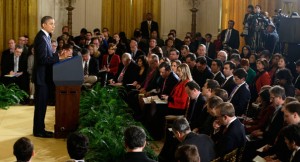UNITED NATIONS — Yes, the widening attacks on the press, and arrests and intimidation of journalists were disturbing and among the barriers to the free flow of information worldwide in 2013. But beyond the usual lists of suspects blocking and censoring news and the Internet, there’s a definite and deadly spike in violence against reporters, ranging from the Syrian civil war to drug cartel intimidation in Mexico.
Even the U.S. government’s commitment to freedom of expression has been called into question.

The Committee to Protect Journalists (CPJ), a media watchdog group, presented its annual survey “Attacks on the Press,” which according to Executive Director Joel Simon, “describes the threats and explores strategies to safeguard the free flow of information.” Simon stressed, “The primary battlegrounds for press freedom used to be contained within the borders of authoritarian states.”
While the Report stresses that “Syria remained the most deadly place for journalists on the job in 2013, Iraq and Egypt each saw a spike in fatal violence … in total 70 journalists lost their lives.”
Alarmingly, for the second consecutive year, Turkey was the world’s leading jailer of journalists (40) followed by the Islamic Republic of Iran (35), the People’s Republic of China (32), Eritrea (22), and Vietnam (18). There are 211 journalists in jail worldwide.
In Turkey for example, the Ankara government passed a controversial new law severely restrictive to the Internet which “blocks sites deemed harmful,” by the authorities.
According to Sherif Mansour, a CPJ regional specialist, “Iran remains the second largest jailor of journalists around the world.” Despite the new “reformist” President Hassan Rouhani, “we don’t see lots of hope” but there “are promises from the government.”
Equally he added that Egypt now facing the political turmoil of the post-Muslim Brotherhood era, has seen a “deterioration” in freedoms and is the third most dangerous country for the press.
Yet beyond the traditional dangers there are new technological threats to the free press. The CPJ adds, the “damaging effects to press freedom by the U.S. mass surveillance programs. …the scope of the NSA’s digital spying raises doubts about the U.S. commitment to freedom of expression and strengthens the hand of China and other restrictive nations in their calls for more government control over the internet.”
According to Joel Simon, “A coalition of internet restricting nations including Russia, Iran, Saudi Arabia and countries throughout Africa and the Middle East have formed an international coalition calling for the United Nations to take over Internet governance.” He adds, “The Chinese argument is that the Internet serves the U.S.”
Addressing correspondents Simon added, “The UN must defend freedom of expression,” and warned that the world organization must not allow some member states to “use the UN to censor freedom of speech.”
“The credibility of the United States as a global champion for freedom of expression and human rights is undoubtedly damaged by the NSA revelations,” argues Marietje Schaake a Dutch member of the European Parliament.
There’s some good news if mixed from Africa. South Africa has the “freest press in Africa. ” While many of the freedoms owe themselves to the legacy of Nelson Mandela, today under President Jacob Zuma “political rhetoric critical of the news media has hardened, an instinct of secrecy is on the rise, and Zuma himself has been quick to criticize newspapers, columnists and cartoonists with court action.”
According to Sue Valentine, CPJ’s Africa program coordinator, “ For the time being the South African media remains dynamic and determinately free protected by a growing body of jurisprudence and a vigilant civil society.” She adds, “Most media outlets are defiantly independent and investigative journalism is thriving.”
Russia presents an enduring challenge to press freedoms. Despite the glowing Winter Olympic media coverage, Putin’s Russia continues to “censor and intimidate” the press and the Russian government has wide ranging powers to stifle dissent. Putin’s leadership according to the Report, marks “an increasingly hostile atmosphere for the press.”
Mexico presents another side of the coin. Part of the outskirts of the metropolis of Mexico City are in the hands of drug cartels. The Neza district just miles from the city center is controlled by gangs, “few people are aware of the cartels spread, state by state, let alone that they have reached Mexico City,” writes Mike O’Connor. “The drug war “ he adds, “was supposed to be taking place ‘out there’ in the provinces.” Indeed the Mexican media is largely intimidated from covering this scourge on their doorstep and in dangerous proximity to the USA.
John J. Metzler is a U.N. correspondent covering diplomatic and defense issues. He writes weekly for WorldTribune.com. He is the author of Transatlantic Divide ; USA/Euroland Rift (University Press, 2010).


You must be logged in to post a comment Login